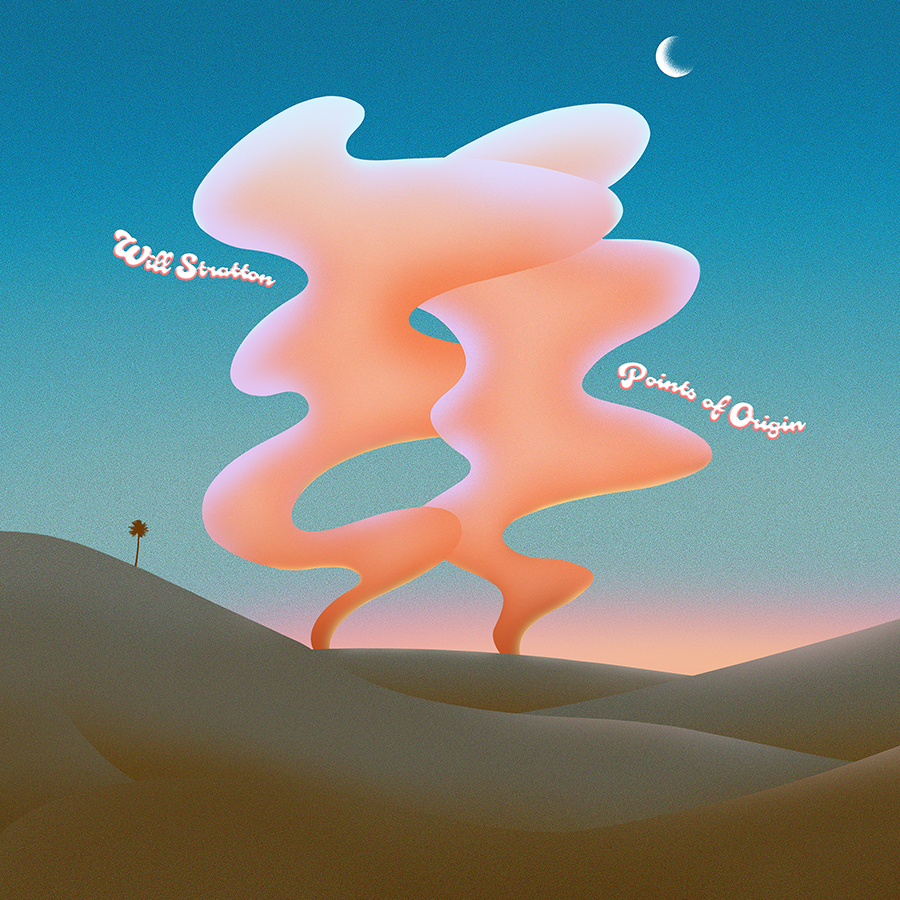
Points of Origin
—
Release on 07 March 2025
—
Bella Union



When the forest burns, what ghosts rise as steam from the boiling soil?
The puny, beautiful, sun-bleached lives of truckers, surfers, runaways, drunks, thieves, CIA operatives, foresters, arsonists, lawyers, and painters intertwine, fall apart, and are ultimately reduced to dust in the 10,000 year-long span of Points of Origin, a heartbreaking and expansive album of songs by Will Stratton set in the freeway wilds of California. Novelistic, as dense as a Pynchon picaresque, and just absolutely lovely to listen to, these ten songs contain some of the most poignant considerations of the horrifying realities of anthropocentric climate change ever set to melody. These wildfires, these mudslides, these intensifying storms – we caused them and every single one of us has a story, interconnected and touching others as our world burns. May the flames that lick menacingly at the border of the frame cleanse us of our wrongdoings.
With sober, unvarnished vocals front-and-center of the mix like never before in Stratton’s music, the true focus of these songs is the captured, storied souls they contain. This approach calls to mind Lee Hazlewood’s album Trouble is a Lonesome Town—tuneful portraits of an assembly of people lit in sharp relief against the ravages of the West—but many of the touchstones for this work are more filmic or literary than musical. Most of these songs occupy an entirely independent point of view – some are driven mad, some paranoid, some wistful, and in one thrilling instance the narration zooms out entirely, evoking the prehistoric sequences from Terrence Malick’s Tree of Life. Stratton gives each new fictional perspective beautifully specific verbiage—who else could manage to squeeze “AQI”, “Tioga Pass”, and “Victorville” into rhyming phrases?—that gives them an eerie, realistic quality. The silver-tongued mortgage spells of a real estate agent selling what is known to be a doomed property, in “Higher and Drier”—is buying a house in California necessarily a deal with the devil? One can’t help but be reminded of Paul Thomas Anderson’s adaptation of Inherent Vice – the ensemble cast, the film grain excellence, the general California-ness, the impending sense of doom. There are similarities in scope and pace, too, to the work of filmmaker Kelly Reichardt who, especially in the film Old Joy, lets dialogue wither among the grandeur of the trees. And much like in Richard Powers’ tree opus The Overstory, these characters’ lives in the shadows of the Earth are interconnected in deed and through the generations, interwoven like an ever-tightening snare grabbing the leg of a passing fox.
At first, longtime followers of Will’s music may miss the hummingbird flutter of his fingerpicking—though there is some undeniably marvelous guitar playing both by Will and his session killers, he’s put the dazzling pull-offs on the back-burner, instead relying on more delicate piano and string ensemble overdubs that fade in and out, like catching the edge of a classical station just out of range as you drive up the Pacific Coast Highway. Will’s undeniable gift as a studio tinkerer is at an impressive peak here. At times the album sounds like the kind of otherworldly country music you only ever hear at a distance. “Temple Bar” notably does an amazing impression of Paul McCartney fronting the Band in their mode as historical reenactors. Many eras are evoked at once—weeping slide and steel guitar, 60s pop vocal harmonies, Richard Thompson at his most ascetic, Jerry Jeff Walker at his most nostalgic, Nick Drake at his most orchestrated, ghostly digital specters swooping in during the chorus of “Centinela”, even one moment of stately Thin Lizzy-esque dueling. At the end of the dissociative “Bardo or Heaven?”, layers of saxophone and overdriven guitar sublimely roil and rage, a column of approaching flame. Occasionally, Will’s writing on this album seems to echo a more ancient oral tradition, as if the DNA of some 16th century ballads were somehow spliced with the lonesome stories of Denis Johnson, giving these songs a hypnotic lullaby quality—one could imagine these songs still being interpreted 500 years in the future, when glaciers are only remembered in verse.
There’s an endless, ancient quality to the western edge of the contiguous United States—cliffs jut perilously over the sea worn down by wind at a geologic scale while the surviving, impossibly elder redwoods silently regard our human folly. Even if the seas seethe and life as we know it perishes, the breakers off of Doheny will continue to hypnotically slosh in. What does the endless parade of drunks, holy men, and fools who once caroused in a bar reduced to cinders mean to a sequoia that began its journey as a sapling two thousand years ago? We’ll see who has the last laugh when saws, tectonics, or sparks of flame bring the giants toppling to the dirt.
Ben Seretan, Climax, NY, October 2024
About Will Stratton:
Points of Origin is Will Stratton’s eighth LP, his third for Bella Union, and his first in the US for Ruination Records. His previous two albums, 2021’s The Changing Wilderness and 2017’s Rosewood Almanac attracted positive recognition from the likes of Elton John, Alexis Petridis at The Guardian, Tom Doyle at MOJO, and Saby Reyes-Kulkarni at Pitchfork. Stratton was born in Woodland, California in 1987, spent his formative years all over the greater Pacific Northwest and mid-Atlantic United States, and has lived and worked in the Hudson Valley town of Beacon, New York for the better part of the last decade.